"On his return from his European triumphs, he entered into an engagement
with his mother never again to play for a money or other stake; never to
play a public game or a game in a public place, and never again to
encourage or countenance any publication of any sort whatever in
connection with his name."
-Charles A. Maurian, May 2, 1877
According to Regina Morphy-Voitier, Paul spend two months in Havana on his
way to Paris. He stayed at the Hotel America where his presence became known
around the
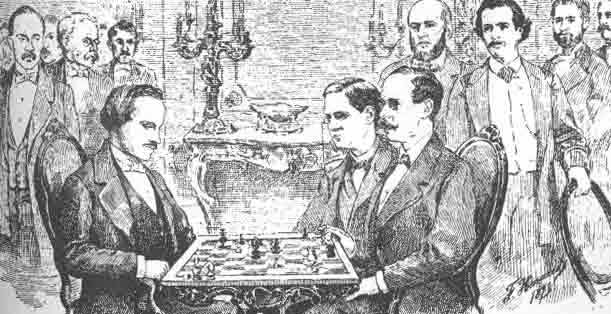 16th
of October and a committee consisting of Señors Don Blas Du Bouchet, Don
Vicente, Don Aureliano Medina and Don Felix Sicre called upon him at the hotel.
Suddenly he was besieged with private invitations and banquets in his honor. 16th
of October and a committee consisting of Señors Don Blas Du Bouchet, Don
Vicente, Don Aureliano Medina and Don Felix Sicre called upon him at the hotel.
Suddenly he was besieged with private invitations and banquets in his honor.
Morphy, in turn, played some games and gave some blindfold demonstrations,
mostly notably one on October 18, probably at Sicre's home. Among his opponents
in Cuba were Señors Medina, Fesser, Toscano and Sicre. He also played against J.
M. Sicre, a slave of Felix Sicre, who, as it seems, was a strong chess player.
Maurian also played a few games with their hosts.
On October 31, after attending a banquet given by Señor Eduardo Fesser at
L'Hermitage, a French Inn, Morphy and Maurian booked passage on a mail steamer
heading for Cadiz, Spain. After arriving in Cadiz, they took a train to
Paris. Not a lot is known about Morphy's stay. David Lawson claims, without
giving specifics, that in December of 1862 an "American correspondent for the
New York Times in Paris" wrote:
Since my arrival I have met with Mr. Paul Morphy, the famous chess player,
about whose doings and whereabouts such contradictory reports have been
circulating in the United States. Mr. Morphy has not been on any rebel
general's staff, nor has he taken any part in the war. He left New Orleans
long after the capture of the city by Federal forces and went to Havana,
taking passage thence to Cadiz, and reached Paris a few days ago. Kolisch, the
eminent Hungarian player is also here, and chess amateurs are making an effort
to bring about a meeting between the greatest chess genius of the world and
another star not worthy to encounter the master. Morphy, however, assures me
he has renounced chess altogether...
Of course, the chess Morphy had renounced was competitive chess. He still
played with friends and for enjoyment. He played games at the homes of
both Rivière and Doazan. Besides Morphy, Gabriel Eloy Doazan, who had played
both Deschapelles
and Bourdonnais, in a letter written later to George Allen, expressed some of his observations:
After Deschapelles
and Labourdonnais, I was lucky enough to see a young man whom one can and
whom one must place in the same bracket. His superiority is as obvious as
theirs. It is undeniable too and reveals itself in the same way.
- is Morphy as good as or better than Labourdonnais?
I was often asked this question, to which it is
impossible to answer in a simple and affirmative way. Some reflections will
help understand this impossibility. Art has several faces, and should be
examined, analysed, appreciated in various aspects by seeing things from
different points of view.
Is Raphaël a greater painter than Rubens? Another pointless and insoluble
question.
...
Let us come now to Labourdonnais and Morphy, one entering life, the other
dead, but both immortals! I do not want to compare them, I will leave
someone else the sad task of lowering one of them just to raise the other. I
only want to emphasize the strange contrast of their organizations and to
highlight the impossibility of a discussion the purpose of which would be to
demote one of them to the second rank.
...
In Labourdonnais' time, chess was still a game. A game infinitely higher
than any other, but one which excluded neither gaiety nor animation. The
loss of one or two games was suffered without irritation and was not looked
upon as a disastrous event, a major humiliation which lowered you in the
opinion of your contemporaries and of posterity while giving victory to your
enemies. These expressions are exaggerated, undoubtedly; but this expression
is founded on something real. Yes, by making efforts everywhere and
unanimously to improve the theory of chess, while trying to make it a
positive science, we changed, so to speak, the aspect of the play; and the
very character of the players was appreciably modified.
When Morphy doesn't play a move for twenty minutes, he
analyses the positions, calculates all the variants and their consequences
until their last limits, without the least apparent effort; his face remains
calm, blood does not rise to his forehead. It is an incomparable power of
abstraction and a clearness of intuition that one cannot admire too much. So
like all real chess-lovers, I just watch, wait and admire. But, not far
away, there are players of fourth or fifth force who make us just as long
for a bad move. This systematic slowness is the wound of our time. Ancient
times were less serious: Allow me to miss them for some reasons.
These general considerations will help us understand
better what I have to say about these two famous players. We know Morphy,
his distinction, his reserve, his sobriety, the delicacy of this young body
which supports a head so admirably formed; moreover, the bust by Lequesne
and his photo and engraving reproductions have made his features familiar to
all, so to speak, popularized them. The features of Labourdonnais are
unknown to the majority of current players. For me, who lived with him, they
become uncertain as time goes on and our memories weaken. Instead of a
portrait, we only have a sad caricature drawn from a dreadful mask molded
after death.
Morphy's mother,Thelcide, and his
sister, Helena, had arrived in Paris long before Paul. They were visiting
his other sister, Malvina, who had moved there a few years before - though
her husband, John Sybrandt, spent most of his time in the United States
conducting his business. In Paris Morphy met with his family but led a life
apart from them.
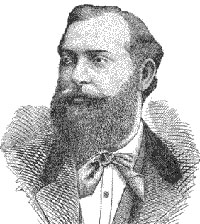
Ignatz Kolisch
Learning that Morphy was in Paris,
Ignatz Kolisch
took the opportunity to challenge him to a match.
On February 14, 1863, (published in La Nouvelle Regénce in March 1863)
Kolisch wrote to Morphy:
Sir:
The distinguished reputation you have acquired at chess
has long since excited in me an ambition - presumptuous perhaps, but very ardent
- to have the honor of encountering you at that game. You will remember that two
years since my friends endeavored to bring us together and transmitted you a
proposal, to which you replied by a promise equivalent to a formal engagement in
case you should ever return to Europe - a promise which was made public in the
American journal, Wilkes' Spirit of the Times, and which has been
registered in La Nouvelle Regénce. On the faith of this engagement I left
England when I heard of your arrival in Paris to put myself at your disposal.
Knowing, however, that at the beginning of your visit private considerations
withheld you from playing chess, I abstained from communicating my resolution.
But now, Sir, that you have resumed a recreation in which you so much excell
[sic], and daily play the game with various adversaries,
the time appears to arrive when I can recall to you your former promise.
I am sure, Sir, that I shall not appeal to your
courtesy in vain; and I believe you will think it reasonable that I should
exercise the same liberty which you used when you first came and threw down the
gauntlet to the chief players of Europe.
Justified by both your promise and your example, I have
the honor to propose to you a chess match. The conditions, if you please, shall
be the same as those first proposed to you in the letter of the secretary of the
St. George's Club - namely, that whichever of us wins the first eleven games
shall be pronounced the conqueror.
Awaiting your reply, I beg you to accept the assurance
of my consideration, &C.
Ignatz Kolisch
In response to this seemingly reasonable challenge, Morphy apparently sent to
Kolisch (and to La Regénce) a note, declining the offer to play,
explaining his desire to divorce himself from competitive chess. In addition,
Morphy sent a note to La Regénce, asking them to publish this
additional statement:
"I could have believed at the time when hearing of your successes that you
are superior to other players I had encountered in Europe, but since, as you are
well aware, the result of your matches with Messrs. Anderssen and Paulsen had
not been favorable to you, there is now no reason why I should make an exception
in your case, having decided not again to engage in such matches, an
infringement of my rules which I should be obliged to extend to others, &C, &C.
Paul Morphy
Morphy further indicated his resolve to abandon competitive chess in his
letter to Willard Fiske dated February 4, 1863. It was ostensibly a reply to
Fiske concerning an invitation to Morphy by the Vienna Chess Club:
My dear Fiske,
Pray, do not be too prompt in condemning the tardiness
of my reply, for in this case at least, it can be justified. I have purposely
abstained from returning an immediate answer to your favor, in the hope of being
enabled to take a trip to Vienna, not for the sake of chess-playing, but
activated by the very natural desire to see you after such a lapse of time as
has gone by since my last visit to New York, and inquire about old friends and
associations made doubly dear by the sad events that are transpiring in our
distracted America. Much as I would enjoy a visit to Germany for those and other
reasons, I am sorry to say that it will not be in my power to leave Paris at
present. I am here with my brother in law and part of my family, the remainder
being in New Orleans. We are all following with intense anxiety the fortunes of
the tremendous conflict now raging beyond the Atlantic, for upon the issue
depends our all in life. Under such circumstances you will readily understand
that I should feel little disposed to engage in the objectless strife of the
chess board. Besides, you will remember that as far back as two years ago I
stated to you in New York my firm determination to abandon chess altogether. I
am more strongly confirmed than ever in the belief that the time devoted to
chess is literally frittered away. It is, to be sure, a most exhilarating sport,
but it is only a sport; and it is not to be wondered at that such as have been
passionately addicted to the charming pastime should one day ask themselves
whether sober reason does not advise its utter dereliction. I have, for my own
part, resolved not to be moved from my purpose of not engaging in chess
hereafter. The few games that I have played here have been altogether private
and sans facon.
I never patronize the Café de la Regénce; it is a low,
and, to borrow a Gallicism, ill frequented establishment.
Hoping that you will excuse my dilatoriness, and
wishing you health and happiness,
I remain Yours truly,
Paul Morphy
P.S. Sybrandt begs to be kindly remembered to you.
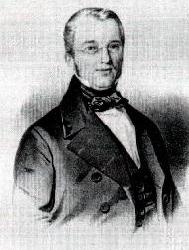
During Morphy's first trip to Europe, Prince Sergei Urusoff, one of Russian
master Alexander Petroff's frequent opponents, had written a letter to
Morphy inviting him to Russia to play a match with Petroff. Morphy, of course,
couldn't make such a a trip and the match never occurred. During Morphy's second
visit to Paris, Petroff was living in Warsaw and came to Paris with his
daughters to visit a health spa. He was very aware of Morphy's presence.
Petroff, born in 1794, was considerably older than Morphy and had retired from
active chess but he still greatly desired to play the famous American. Morphy,
also retired from chess, met with Petroff on two occasions.
Urusoff had described Petroff as: "tireless, and that is a great
virtue; he is not nervous like Harrwitz and does not yawn like Anderssen He is
like Morphy in everything but has an advantage over him in years."
Alexander Petroff
Marginal notes found in Petroff's 1859 and 1860 issues of Shakmatny Listok
indicate that Petroff had studied and analyzed many of Morphy's games.
Particularly notated were Morphy's handling of the four Philidor Defenses
employed by Harrwitz during their match.
Petroff was quoted, in the Shakmatny Listok as saying: "As far
as a match with Morphy is concerned, why not play? I'm ready to play whenever
they will back me... I don't regard myself as Morphy's equal in strength."
The chess world was ready for a confrontation between these two living
legends:
"We have heard about the coming encounter between Morphy and Petroff. This
will truly be one of the most remarkable battles which has ever taken place.
This will be a splendid day for chess."
- La Nouvelle Regénce, July 1863
"One of the oldest and most accomplished masters, Mr. Petroff (now 69 years
old), has lately enlivened the Chess circles of Paris by his presence. His stay,
for the moment, was a brief one but he intends, it is said, to return to the
French capitol in a few weeks and make it his home for the winter. Should he do
so, the expectations are entertained that Mr. Morphy, who is still in Paris,
will be tempted to break a lance with the Nestor of Russian chess. In that case
we may anticipate the pleasure of recording some of the finest games which have
been played since the great combats of twenty or five and twenty years ago.
During his recent sojourn in Paris, Mr. Petroff was a frequent visitor to the
Café de le Regénce (and played with Journaud and others).
-Howard Staunton in the Illustrated London News, November 7, 1863
However, a match wasn't to take place. Petroff wrote to Mikhailov, the editor
of Shakmatny Listok: "I've visited Morphy twice, and he has
visited me. Doazan has told me that he has absolutely given up the game."
While no games between the two have been recorded, they did meet on several
occasions. It seems that Morphy met with other Russians besides Petroff. He is
thought to have made the acquaintance of the Russian novelist Ivan Turgenev
(1818-1883) and while they may not have met, Leo Tolstoy, who was in London in
1861, is known to have purchased, while there, a book on Morphy for his personal
library.
In the end of January 1864, Morphy left for New Orleans to see what
could be salvaged from the results of the Civil War and Northern occupation.
Arriving in Santigo de Cuba and then making his way the 540 miles north-west
to Havana on the steamship, Aguila, on February 16, Morphy only spent two days
on the island despite his warm welcome.
The rich banker, Mr. Francisco Fesser, gave a sumptuous banquet on Tuesday in
honor of the celebrated chess player Mr. Morphy who should be leaving today for
New Orleans. aturally the greater part of the invited guests were enthusiasts of
the noble game in which Mr. Morphy recognizes no rival, but this was no reason
why we could not count many and very beautiful ladies of our high society.
Before dinner he played a game with Mr. Sicre, giving him a knight. Later he
played alternately several games with Messrs. Dominguez, Golmayo, and Sicre, by
memory, while carrying on at the same time an animated conversation with the
estimable family of Mr. Fesser. On all the games he came out the winner,
being applauded each time his fatigued opponents gave up their games and asked
for grace... Among the invited guests we could count Messrs. Villergas, Golmayo,
Sicre, Dominguez and Palmer, very well known for their affection for the
difficult game, and the Messrs. Valdes, Cespedes, La Calle, Diaz, Albertini and
others.
-the Havana El Tiempo, February 18, 1864
Morphy played Celso Golmayo five games at Knight odds, winning two, losing
three. El Moro Muza repoted that:
Mr. Morphy having played several games with Señor Golmayo, to whom he gave a
Knight, has come to confess frankly that Señor Golmayo is too strong to receive
a Knight from him and that the most he could give him would be a Pawn and two
moves, a declaration that places Señor Golmayo at the very highest level amongst
chess players.
In return, Goyomayo, in the April 1888 issue of the Charleston Chess
Chronicle wrote:
In my many games with Morphy at odd of a Knight, I became hopelessly
bewildered by the brilliancy and the intricacy of his combinations, but when I
sit down with Steinitz on even terms I feel as though I have a very respectable
chance to win.
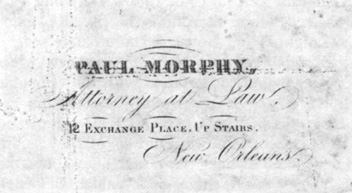
Morphy arrived in New Orleans the last week of February at which time
he tried to establish himself in his profession.
David Lawson is adamant that it was after his return from Paris in 1864 that
Morphy first attempted to open a law office on 12 Exchange Street.
It only survived a few months.
Elsewhere [e.g. p.26, Morphy Gleanings] it is stated
erroneously that he opened a law office soon after his return in
1859, but this was his first time to establish himself at
his profession.
After the end of the war, Morphy decided to go to New York to attempt to
discuss the possible publication of a book of his games which he would annotate.
He left for New York around July 25 and met with Daniel Fiske and Napoleon
Marache. Marache and Charles A. Gilberg aided Morphy in trying to amass the
texts of his games from a variety of sources (his uncle Ernest wrote to the
editor of La Stratégie on March 14 that Paul was in New York working on
some of the proofs to a four volume collection of his games to be published by
Appleton). They worked on the project for several weeks but with financing tight
after the war, a book had to have more than speculative value. The book of
the Fifth American Chess Congress explains that the project fell through because
they couldn't come to financial terms. According to Gustavus Charles Reichhelm
[president of the Philadelphia Chess Club as well as a chess editor and an
historian of chess in Philadelphia], Morphy had applied to him for the scores of
some games he played in Philadelphia and that he learned that the project ended
because Morphy refused to play any new games which might make the book more
salable and worth investing in.
Returning to New Orleans in the beginning of November, the New Orleans chess
club revitalized itself and on November 14, 1865 elected Paul Morphy as it's
president with Charles Maurian as secretary. Morphy is known to have played a
four board blindfold simul of which the score of only one game, against Paul
Capdevielle, has survived.
Little is known about Morphy's legal activities. Other than his chess games
with Charles Maurian, little is known about Morphy's activities for the next two
years. Whitelaw Reid, an author who was in the South gathering material
for his book, "After the War: A Southern Tour," met Morphy at a soirée at
the home of Christian Roselius, Dean of Faculty at the University of Louisiana
and a Professor of Civil Law. After commenting on the abundance of fine spirits
and wines and the general absence of ladies at these soirées, Reid described
meeting a "modest-looking little gentleman of retiring manners with
apparently little to say; though the keen eyes and well-shaped head sufficiently
showed the silence to be no mask for the poverty of intellect." He then
interjected his opinion that Morphy was "the foremost chess-player of the
world, now a lawyer, but, alas! by no means the foremost lawyer in his native
city."
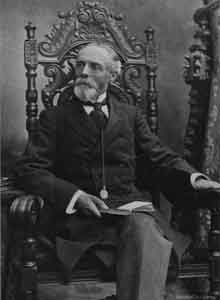
Born near Xenia, Ohio on Oct. 27, 1837, Whitelaw Reid became a war
correspondent for the Cincinnati Gazette, served as served as
aide-de-camp to General William S. Rosecrans and was present at both Shiloh and
Gettysburg. After the war he took up cotton-planting in Louisiana for a while
resulting in After the War. Horace Greeley hired him to work for the New
York Tribune . When Greeley died in 1872, Reid took his place as editor,
printer and circulation manager. In 1881, Reid married
Elizabeth Mills, the daughter of Darius Ogden Mills, a California
millionaire. In 1892 he ran as the Vice Presidential candidate with Benjamin
Harrison. He also wrote: Ohio in the War - 2 vols., 1868; Schools
of Journalism, 1871; The Scholar in Politie 1873; Some
Newspaper Tendencies, 1879; and Town-Hall Suggestions, 1881.
He died Dec. 15, 1912.
Whitelaw Reid
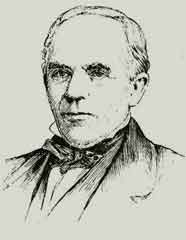
Christian Roselius was born on Aug. 10, 1803 near Breman, Germany. In 1819 he
emigrated to New Orleans. First he became a successful lawyers, then from
1841-1843, he was appointed Louisiana State Attorney General. In 1857 he was
named Chief Justice of the Louisiana Supreme Court. The last 20 years of his
life were spent as Dean of Faculty and professor of Civil Law at the University
of Louisiana. A well read man, he possessed on of the largest private libraries
in the South and was known as a congenial and generous entertainer whose soirées
were well known and well attended. He died Sept. 5, 1873.
Christian Roselius
In July of 1867, Morphy accompanied his mother and sister, Helena, to Paris
where they spent the next 15 months. That same month in the Grand Cercle, 10
boulevard Montmartre, The Grand Tournament of Paris was taking place in
conjunction with the Exposition Universelle, the Paris International
Exhibition. Although the tournament started in June and concluded in July, it was
rumored that Morphy might enter it. Nothing could have been less likely.
Morphy wasn't interested in playing chess at all in Paris. (The prize-winners in
order were: Kolisch , Winawer, Steinitz, Neumann, De Vère and De Rivière).
Morphy spent time at the home of Arnous de Rivière and associated with Gustav
Neumann and Eugene Lequesne, but seemed to have never played a single game of
chess.
Sergeant relates W. J. A. Fuller's account of of
running into Arnous de Rivière at the Café de la Régence in the summer of 1885.
De Rivière told Fuller that Morphy had pawned his watch while engaged in some
expensive legal matters (referring here to p.73 concerning Morphy's suit against
his brother-in-law John Darius Sybrant, the administrator of Alonzo's estate)
and that Rivière had "loaned Morphy a large sum of upon it" and that "the
pledge was never redeemed."
Adding some substantiation to Fuller's account,
Sergeant continues by relating how that Augustus Mongredien's son, A. W.
Mondgredien, saw the watch in Paris, 1921, at which time he could have bought it
for 6,000 francs from the heirs of Arnous de Rivière.
Lawson adds (p.292) that "His present
circumstances suggested to him that his brother-in-law Sybrandt, the
administrator of his father's estate, had defrauded him or mismanaged the estate
and so Morphy started an absurd lawsuit against him which came to nothing - he
had probably spent most of his available patrimony before his second trip to
Europe, one reason why he had taken a large loan on his watch while there."
According to Lawson, Sheriff W. C. Spens wrote in the Glasgow Weekly
Herald, July 19, 1884 - which would be 17 years later -
Morphy returned to Paris, where he had a married sister living. Events had
proved disastrous to his parents [the Civil War] and also blighted his own
prospects, which had such a depressing influence on his over-wrought mind, that
it perfectly paralyzed his energies. He lost his taste for chess entirely.and
Neumann told us in 1867 that he could never prevail upon Morphy to play a game.
They frequently met at De Riviere's house, and Morphy would occasionally
condescend to look at some variations, when the Paris congress book was being
prepared for press. We recollect his coming once as far as the door of the
Régence to make some inquiries, but he would not enter, in spite of M.
Lequesne's entreaties.
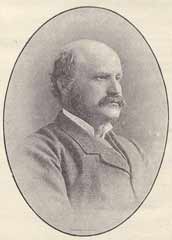
According to Edward Winters' Chess Note #4053, entitled The Pride and
Sorrow of Chess: "On page 113 of the April 1885 International Chess Magazine
Steinitz wrote:
‘... the fearful misfortune which ultimately befell “the pride and sorrow of
chess”, as Sheriff Spens justly calls Morphy, can only evoke the warmest
sympathy in every human breast.’
Sheriff Walter Cook Spens (Feb.1, 1842 - July 13, 1900) was a leading
Scottish player and one of the founders of the Scottish Chess Association
in 1884.
His tournament achievements include:
10th Dundee, 1867; 11th Glasgow, 1875;13th Cheltenham, 1876;
10th Manchester, 1882; 6th-8th Birmingham, 1883; 3rd Glasgow, 1884; 7th
Edinburgh, 1885;
9th-10th Glasgow, 1886; 7th Edinburgh, 1887; 6th-7th Glasgow, 1888;
3rd-4th Edinburgh, 1889;
1st-2nd Dundee, 1890; 8th-9th Manchester, 1890; 3rd Glasgow, 1891; 6th
Edinburgh, 1892;
1st Glasgow, 1893; 3rd-4th Edinburgh, 1895; 4 Dundee, 1896; 4th-5th Stirling,
1899; 5th Dundee, 1900
Sheriff Walter Cook Spens
According to the chess column in the Scotsman newpaper, "The Spens Cup
was donated by Sheriff Walter C Spens, the founder of the SCA, in 1901. The
current trophy is a 1946 replacement after the original was destroyed during the
Second World War."
"Sheriff Spens is alleged to have won the shortest ever game in the
Scottish Championships, "about 1893". 1 e4 d5 2 exd5 Qxd5 3 Nb3 - White was
distracted while in conversation and intended Nc3. Since Nb3 is illegal the
rules of the time required a king move be played, so 3 Ke2 Qe4 mate! This
story is recounted in the British Chess Magazine of January 1932 by six-time
Scottish champion, Dr.Ronald MacDonald, but there is some doubt as
to its veracity. The Graham Burgess book The Quickest Chess Victories of all
Time does not mention Spens but gives the same moves in an 1893 (!) game
Lindemann-Echtermayer, from Kiel, Germany."
Morphy returned to America arriving in New York in September, 1868, where he
stayed at the New York Hotel (and avoided the New York Chess Club) a few days
before returning to New Orleans where his life became as hidden as it was (most
likely) simple and monotonous.
Between 1868-9 Morphy and Charles Maurian played 4 series of games at Knight
odds.
Series 1 - Morphy 6, Maurian 3, Drawn 2
Series 2 - Morphy 3, Maurian 3
Series 3 - Morphy 7, Maurian 10
Series 4 - Morphy 0, Maurian 4, Drawn 1
After the last series, played in December 1869, Morphy informed Maurian that
he was now too strong to receive Knight's odds and thenceforth he would only
receive the odd of Pawn and two.
According to Sergeant's Morphy Gleanings
In the biography of Morphy in the Book of the Fifth American Congress
it is stated that he retained his interest in chess, after ceasing to play, to
the extent of analyzing and solving problems. He did not compose. Judge L. L.
Labatt, of New Orleans, relates that Morphy, after he had given up practical
chess, could read down the score of a game and get the entire game in his mind.
He could then point out the weak moves in the loser's game and would say he
could beat "any of these fellows."
According to Lawson
March 15, 1873 "...a letter from Charles J. Woodbury to the Hartford
Times disclosed that Morphy still played chess, but only on special
occasions and in privacy, although this time it was a "numerous" privacy, so to
speak. Woodbury's interview letter is for the most part taken up with the story
of and comments on Morphy's life. Morphy greeted him in French and Woodbury
replied in the same, and knowing something of the family circumstances may have
mentioned that chess could do a lot for him. As Woodbury reveals, if there was
one thing that enraged Morphy it was constant talk of chess with strangers and
the suggestion that he use his skills at the game for profit:
A flight of stairs leads the way up to the
dwelling-rooms. I had never seen Paul Morphy, but I knew him the moment he stood
quietly before me, simply dressed, slight, smooth and melancholy-faced, with a
head and brow over-hanging with their own weight. So full of dignity, so empty
of self-consciousness, was his presence, that I was almost prepared by it for
the quick answer he made me that he was but an amateur, and was adverse to
notoriety. But the passion of the Creole eyes overspoke the tutored voice at a
remark I made about the contrast between what he said and what he had done. My
imperfect French added to the embarrassment of the moment, and his thin
self-control gave way to one of those paroxysms of passion to which I have since
learned he is constantly subject. Happily, the coming of his mother soon
divested him of the strange suspicion that I thought him to be a professional
gambler; and, afterwards, through Mons. C. A. Maurian, an intimate friend and
the best public player in New Orleans, all of these misunderstandings were
removed...
Once in a while, the solitary athlete can be induced to
show that his power is only in abeyance. I saw him at a private séance, just
before I left, beat simultaneously, in just 2¾ hours, sixteen of the most
accomplished amateurs in New Orleans. His strength had never been fully tested,
and will probably never be fully developed.
Paul Morphy is poor. Unlike a Yankee, he finds it
impossible to live on his talent. Opportunities there are in abundance, - rich
offers for public exhibitions of himself as delicate as those grasped at by men
who would pretend to more honor. He steadfastly refuses them. He was morbidly
sensitive to misjudgment, lest he be taken for one who "travels on his muscle,"
and on all his journeys, defrayed his own expenses, and always played in the
presence only of select companies, to which no money could gain access. There
seems to me to be a certain attraction in this fine delicacy, which one would
encounter not elsewhere among us than in the half-foreign society of New
Orleans, amid which Mr. Morphy was reared. It is dearer to than wealth or
renown, or the strange gift by which he must get his daily bread or go without
it. Some there are who do not live by bread alone."
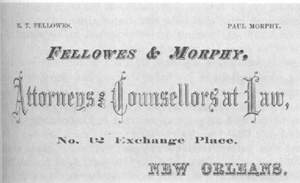
From about 1872 to 1874 Paul Morphy partnered with established attorney E.
T. Fellows. Most information about this venture is speculation. Morphy's
aversion to discussing chess would have made any public profession difficult at
best. The extent of his involvement in this firm is unknown.
In a letter to the New York Sun, May 2, 1877,
Charles A .Maurian explained:
[Morphy] is now practicing law in this city, and has never been
insane, or spoken of in that relation by his family or friends. As to chess, he
is unquestionably to-day the best player in the world, although he does not play
often enough to keep himself in thorough practice. He gives odds of a knight to
our strongest players, and is seldom beaten, perhaps never when he cares to win.
This demonstrates that Paul was doing some sort of legal work
and playing chess as late as 1877.
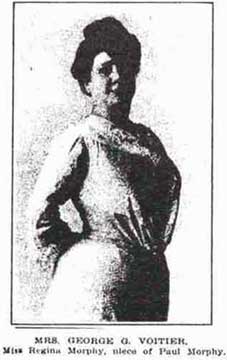
Paul Morphy's brother, Edward married Alice Percy and together they had two
children, Edward (1862) and Regina (1870). Regina Morphy, who was 14 when Paul
Morphy died (1884), married George Gastien Voitier. In 1926 Regina
Morphy-Voitier wrote about her famous uncle from her reminiscences, from family
papers and other research as well as from her connections with people who had
known Paul.
Her finished product was a 40 page paper-covered,
privately-published pamphlet, entitled, "Life of Paul Morphy in the Vieux
Carré of New-Orleans and Abroad"
From this pamphlet we learn something of Paul Morphy's life after
chess
"Paul Morphy was exceedingly fond of
grand opera and very seldom missed a performance at the old French Opera House
on Bourbon Street..."
We learn he liked to walk along Canal St. carrying a cane and
sporting a monocle, admiring the ladies. He generally attended daily Mass at
the St. Louis Cathedral after which he'd continue his stroll, perhaps buying
flowers or "calas" (rice cakes) or cakes from Himbert's "charcuterie
shop."
" ... He was exceedingly fond of tea...He never ate much lunch but invariably helped himself to two cups of tea and
several pieces of buttered toast."
" ... Paul Morphy was exceedingly charitable,
and old age and childhood strongly appealed to him. He was never known to
refuse alms to worthy mendicants."
Morphy Madness |

